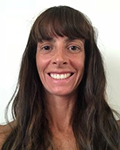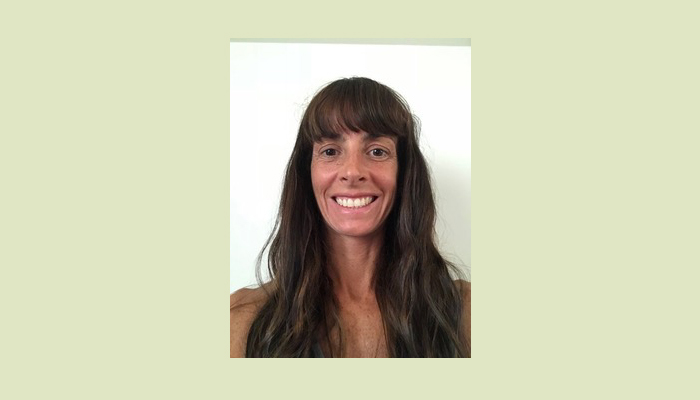We’re taking time over the following weeks to get to know the members of the GSA’s Early Career Scientist Committees. Join us every week to learn more about our early career scientist advocates.

Veronica Donato
Steering Committee
CONICET – Argentina
Research Interest
The brain is subject to unwanted, age-related changes like neurodegeneration later in life. Clinical associations between some neurodegenerative disorders and gastrointestinal diseases have prompted interest in exploring possible links between microbiome disturbances and manifestations of these disorders. I use a beneficial bacteria called Bacillus subtilis to study the effect of probiotics on the lifespan of C. elegans. I’ve discovered that this probiotic, under a biofilm growth condition, can increase the C. elegans lifespan while also attenuating neurodegenerative processes.
Given recent studies focused on the existence of a positive relationship between human health and the microbial flora that colonize the human gut, these findings indicate that this system can serve as a model to explore the microbiome-gut-brain axis. Understanding the complex crosstalk between the gut, its microbiome, and the brain can help us understand how the bacteria living in our intestine can modulate the aging process and neurodegeneration.
Investigations into the mechanisms that orchestrate interactions between the gut microbiome and the nervous system may yield microbiome-based therapies for neuropathologies. These paradigms include treatments with probiotics and/or symbiotics to colonize the gut. My long-term goals are to describe the intracellular pathways that connect probiotics with aging and brain diseases and to discover a probiotic bacterium that extends lifespan, produces a healthy aging process, and improves neurodegenerative diseases in the aging brain.
As a PhD-trained scientist, you have many career options. What career paths interest you the most?
I would like to connect my experience as a researcher in academia to societal issues and problems—and to work to resolve them. By doing this, I want to explore pressing issues, improve communication, and answer questions at the intersection of science, technology, and law. Bridging lab research with technology transfer allows science to grow and eventually become part of the community. To reach this goal, I’m finishing a BS in Law to prepare me to connect the science with legal issues. With this training, I’d like to do research, coordinate activities, communicate science, work in teams, and encourage people. I’d like to work where I can help others understand science while providing guidance to make the science accessible for the general community.
Additionally, finding a position that requires me to focus some of my attention on mentoring and teaching would be nice. I believe that these activities are very important for researchers. Whether by teaching colleagues or students, I enjoy increasing knowledge and helping others develop critical thinking skills. By mentoring others through teaching, I’m able to return what I’ve learned while also learning from others.
In addition to your research, how else do you want to advance the scientific enterprise?
In Argentina, the scientific structures are different from those in the US. We don’t have university campuses; for example, the State School of Biochemistry and Medicine in Rosario, Santa Fe shares one block with a hospital, and we have resources in different locations in the city. Our state universities are free, which enables a large number of international students to attend. We have a diverse group of scholars that train here, providing a great environment to share experiences and to open a student’s mind.
For some, it may be surprising to learn that Argentina has only one Research Council called CONICET. While my country has good science institutes and universities, limitations in funding and available technology make it difficult for graduate students to continue in research careers. The limitation of available resources require Argentinian scientists to look for worldwide positions where they can be competitive and productive; however, this is a challenge, since a successful researcher has to have good mentors, be perseverant, strong, independent, and open-minded. Still, Argentinian scientists have strengths—including their great education level—that allow them to obtain a variety of positions.
Speaking English is also extremely important for success in science. For this reason, as an undergraduate or graduate student, it is mandatory to start a complete English course or to continue practicing the language if you have previous knowledge. In Argentinian universities, English courses cover only a basic level, so students who want to master the language have to take extra courses to improve their skills—but it is an investment in their future goals. Moreover, many Argentinians don’t use English in everyday activities, so extra practice and effort are required to succeed in a lab abroad. This is an important topic for PIs to discuss with students so they can manage future goals and develop a workable plan.
Many Argentinian universities, institutes, and colleges have very good professors, but we don’t really have a strong mentoring tradition. This can present a struggle for students since mentors are extremely important in providing them with guidance, support, and advice. Mentors help students build their minds, learn how to achieve success in life and science, learn to work well both alone and in a team, and learn how to be organized and cooperative. My principal desire is to be part of this guidance as a mentor and as an active member of societies and committees where I can teach and communicate scientific knowledge to scientists and societies around the world.
As a leader within the Genetics Society of America, what do you hope to accomplish?
As a leader within GSA, I hope to create a deeper understanding of the scientific enterprise and how distinct it can look in different countries. It is vitally important that scientists work and train across geographic boundaries to build a better global scientific community. One of the most important topics I’d like to focus on is creating tools that guide students through the application process for training positions in the US. Providing these types of resources will encourage early career scientists to apply for fellowships and grants while helping them avoid mistakes and not misunderstand important cultural norms when preparing cover letters and CVs. I also want to show them how to highlight their individual qualities and talents. What is perhaps even more important to me, though, is to help them see the options and understand the challenges—while supporting their perseverance.
These things are so important because international scholars face many challenges when trying to enter the US, such as language barriers, the visa process, differing diploma equivalences, an unfamiliar education system, unfamiliar processes for applying for positions and/or successful interviewing, and a lack of knowledge of their rights in their new home country. I’d like to help alleviate some of these challenges.
Previous Leadership Experience
- Graduate Teaching Assistant—National University of Rosario
- Volunteer mentor—Mutual Carlos Pellegrini
- Volunteer Coach —AXON Training
Contact































